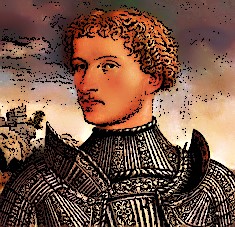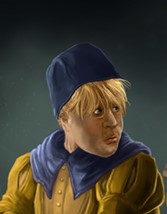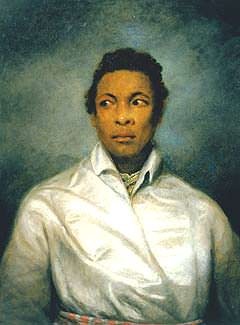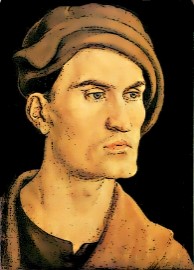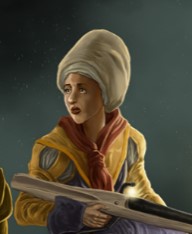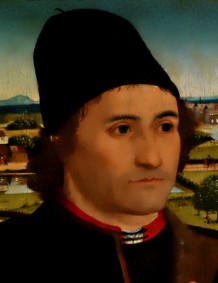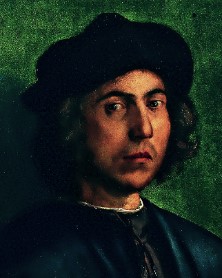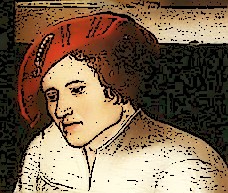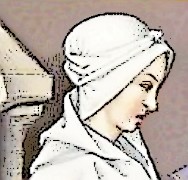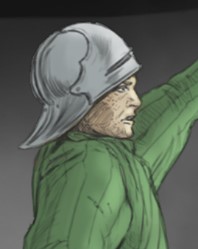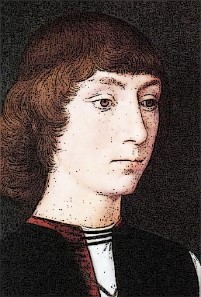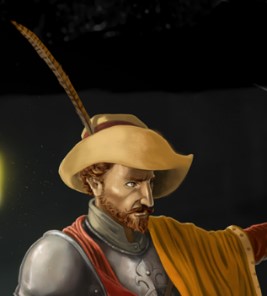Kunes fought in the Black Army as a great-swordsman, typically with the Forlorn Hope, and was involved in action twice against Ottoman Janissaries, during which his courage was noted. Ironically, his resulting promotion to feldweibel cost him dearly. He was stationed on one of the towers in Belgrade on the last day of the siege so he missed out on the final battle and looting, much to his chagrin. Like Jan de Kriek, Kunes often has elaborate plans ready for various situations that come up, but is usually overruled by the older members of the group as being too bold. He and Jan sometimes argue and have had a few heated exchanges over strategy. It doesn’t help that they barely understand each other.
Jan is a journeyman cutler from Bruges, and he loves the craft of making swords and knives and every type of blade, as well as fencing and martial arts. He’s glad to explain these subjects to anyone who will listen. He arrived toward the end of the siege and was stationed on the wall as a gunner so he missed the final battle, and the looting. He also didn’t get paid for his work so once the plague broke out he decided reluctantly to head back to Flanders empty handed, though he’s keen to find new opportunities on the way home if any present themselves.
Enndres joined the Black Army of Janos Hunyadi where he was in charge of a patrol boat operating on the Danube. During the siege his boat was sunk by Ottoman cannon, and he lost a great deal of his personal wealth that he carried with him. Now he hopes to return to Nuremberg and earn his fortune more judiciously, by the practice of his craft: weaving.
A hunter by trade, Nils worked as a Scout for Janos Hunyadi and then as a sutler. But he was cheated out of most of his earnings in a card game when he was very drunk.
Charlotta is a wine merchant from Speyer in the Rhineland, and accompanied a shipment of wine to Belgrade, where she was doing a brisk business selling wine to the soldiers. She did send some money back to her family’s firm, fortunately, because shortly before the siege was lifted her shop was looted by unruly men in the company of Father John of Capistrano. Disgusted with the frontier, she is eager to make her way back home, though she has an eye for wine country and for money making opportunities which may present themselves on her journey.
Gerd is from the town of Konstanz in Swabia, where he has a workshop as a furrier. He joined the Black Army as a mounted marksman in order to make money and pay some debts. He was cautious enough to arrange for most of his earnings to be sent home long before the crescendo of the siege. Now he just wants to get home to his wife and young child.
Simon is from a prominent Genoese family (the Ghisolfi) and is of the Jewish faith, though he is not actively religious (but he does adhere to dietary restrictions). His uncle is an important leader in the Genoese community in the Crimea, where Simon spent most of his adult life. After the fall of Constantinople and the near-miss.
Hanno was a silver miner in Switzerland, and worked for Janos Hunyadi as a sapper. He served with Johannes Grant, with whom he often converses indirectly, by making Gerard van Delft act as a translator in Latin. He asks many detailed questions about the architecture of Constantinople, which he has never himself seen, though he continues to insist that Zurich is a greater city than any in the east. Hanno has great knowledge of mining, of the bones of the country, and understands engineering and architecture.
Kalina does not discuss her purpose for being in Hungary, but it is known that she was close to the inner circle of Fra John of Capistrano. And as soon as he died, she had little to say about him.
Wulf is trained as a locksmith though he never joined the guild, as technically he is still a journeyman. He instead spent many years fighting in the militia against robber knights in Alsace and is a good shot with a crossbow, having won prizes in the Schützenfest. He is also clearly a good fencer though he rarely engages in sport matches with Gerd and Jan. At Belgrade he was working as a gunsmith for Hunyadi, adding matchlock serpentine devices to captured firearms. While with the Black Army he got into a dispute with a soldier who was mistreating a woman, and ended up fighting a duel with the man, who he killed. The incident was famous in Belgrade and he was forced to leave town before being paid, lest he suffer the revenge of the other soldiers. He is still brooding a bit over this incident and his lost pay.
Gerard is trained in medicine and was working as a personal physician for one of the nobles in the Black Army, but when plague broke out his patron quickly died.
Johannes Grant served with the Genoese in the defense of Constantinople, successfully intercepting several Ottoman tunneling efforts. He performed the same role with equal success in Belgrade. Since the siege and its aftermath though, he says he’s had enough of looking at impaled corpses and hopes never to hear the Mehter again. He plans to return to his native Edinburgh and contribute to building up his home town into a great city, bringing ideas he learned during his time with the Italians and Byzantines.
PDF Link Premade Characters for Reiver’s Lament We’ve pre-rolled 7 characters fit for 16th Century Scotland. Each character sheet is an editable …

